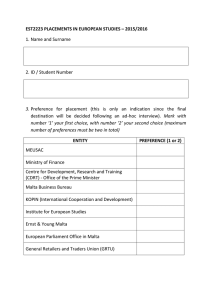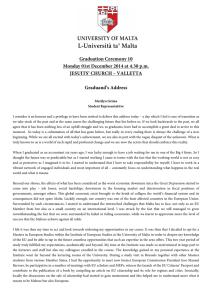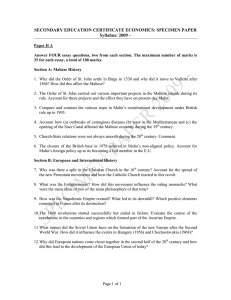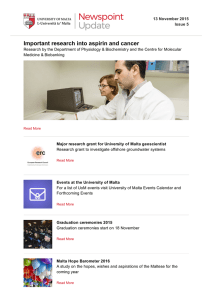by Prof. Paul Sant Cassia B.A. (Hons), PhD (Cantab)
advertisement
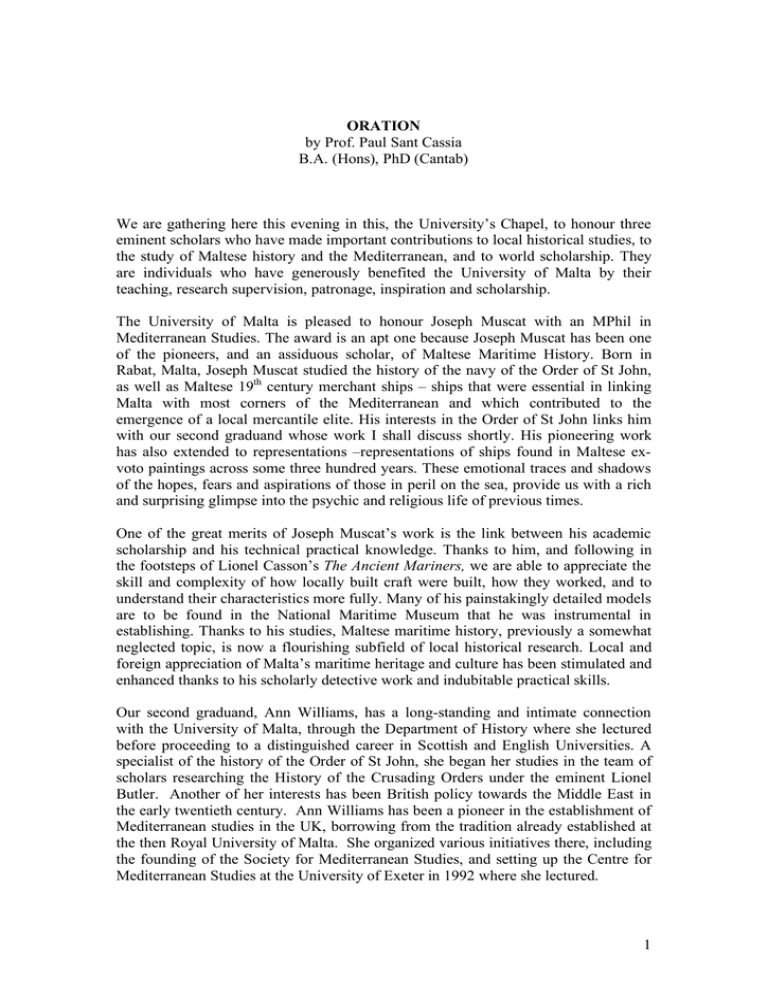
ORATION by Prof. Paul Sant Cassia B.A. (Hons), PhD (Cantab) We are gathering here this evening in this, the University’s Chapel, to honour three eminent scholars who have made important contributions to local historical studies, to the study of Maltese history and the Mediterranean, and to world scholarship. They are individuals who have generously benefited the University of Malta by their teaching, research supervision, patronage, inspiration and scholarship. The University of Malta is pleased to honour Joseph Muscat with an MPhil in Mediterranean Studies. The award is an apt one because Joseph Muscat has been one of the pioneers, and an assiduous scholar, of Maltese Maritime History. Born in Rabat, Malta, Joseph Muscat studied the history of the navy of the Order of St John, as well as Maltese 19th century merchant ships – ships that were essential in linking Malta with most corners of the Mediterranean and which contributed to the emergence of a local mercantile elite. His interests in the Order of St John links him with our second graduand whose work I shall discuss shortly. His pioneering work has also extended to representations –representations of ships found in Maltese exvoto paintings across some three hundred years. These emotional traces and shadows of the hopes, fears and aspirations of those in peril on the sea, provide us with a rich and surprising glimpse into the psychic and religious life of previous times. One of the great merits of Joseph Muscat’s work is the link between his academic scholarship and his technical practical knowledge. Thanks to him, and following in the footsteps of Lionel Casson’s The Ancient Mariners, we are able to appreciate the skill and complexity of how locally built craft were built, how they worked, and to understand their characteristics more fully. Many of his painstakingly detailed models are to be found in the National Maritime Museum that he was instrumental in establishing. Thanks to his studies, Maltese maritime history, previously a somewhat neglected topic, is now a flourishing subfield of local historical research. Local and foreign appreciation of Malta’s maritime heritage and culture has been stimulated and enhanced thanks to his scholarly detective work and indubitable practical skills. Our second graduand, Ann Williams, has a long-standing and intimate connection with the University of Malta, through the Department of History where she lectured before proceeding to a distinguished career in Scottish and English Universities. A specialist of the history of the Order of St John, she began her studies in the team of scholars researching the History of the Crusading Orders under the eminent Lionel Butler. Another of her interests has been British policy towards the Middle East in the early twentieth century. Ann Williams has been a pioneer in the establishment of Mediterranean studies in the UK, borrowing from the tradition already established at the then Royal University of Malta. She organized various initiatives there, including the founding of the Society for Mediterranean Studies, and setting up the Centre for Mediterranean Studies at the University of Exeter in 1992 where she lectured. 1 In Malta, students who enjoyed the experience of her lecturing and tutoring remember her dedication and commitment with great fondness. Over the years she has generously offered her services as visiting lecturer and external examiner for the Department of History where she has long been cherished informally as honorary member. Ann Williams was also instrumental in encouraging her UK students to conduct research in Malta, including some pioneering work on demography and household structures through the detailed study of local status animarum records. Her lifelong selfless and warm engagement with the University of Malta has additionally been expressed in her generous donation of her extensive personal library to the University, where it will be cherished and of great value to students and researchers. We thank Ann Williams most appreciatively for her generosity and for all the years she has been our ambassador overseas. Our third graduand, Professor Sir Jack Goody, Emeritus Professor of Anthropology at the University of Cambridge, has been acknowledged – and here I quote with wholehearted concurrence – as one of the most versatile intellectuals of our times. The great French historian, Georges Duby, characterized Goody’s work as a ‘superb lesson in thoroughness’, and Amartya Sen, the 1998 winner of the Nobel Prize for Economics, commended his work as an essential corrective for the distorted and often selflaudatory view the West has of East-West differences. He is a Fellow of the British Academy and a member of the US National Academy of Sciences, the longest serving Fellow of St John’s College, Cambridge, and a recipient of the International Prize of the Fondation Fyssen. His books have been translated worldwide. His awards include the Gold Medal of the Swedish Society for Anthropology and Geography, the Ichiko Prize for Cultural Studies, Tokyo, the Premio Hanbury, Italy,and Officier dans l’Ordre des Arts et Lettres, Paris. His work regularly gets two page spreads in Le Monde and he is greatly admired in France where intellectuals are happily celebrated without any embarrassment. Jack Goody was born in 1919, making him probably the most elderly person in this congregation. His education at Cambridge in 1938 reading English literature - where he associated with E.P. Thomson, Eric Hobsbaum and Raymond Williams - was interrupted by the Second World War. He fought in the African desert where he was captured, escaped from prison, and then spent six months living under cover in Italy – probably another set of distinctions that nobody in this congregation can claim. But his most important distinction, and for which we honour him most warmly and with immense admiration, is that he is the author of some 26 major books (and I have stopped counting): all ground breaking, all innovative, ranging from kinship, myth, literacy, technology tradition and the state, European family structures, cooking cuisine and class, food and love, the culture of flowers, representations and contradictions, European and other Renaissances, Islam, India and China. His latest book, currently in press– for he seems to complete a book per year much to our shame – is on the comparative role of metals in the evolution of culture and civilization, in particular Europe and China. We owe Sir Jack Goody’s move from literature to anthropology to his encounter with two books when in a German prisoner of war camp: Frazer’s Golden Bough and Gordon Childe’s What happened in History. The first introduced him to symbolism 2 and its complexity as well as the social role of the text. The second stimulated his interest in the links between major technological change, social evolution and social forms such as family and property transmission. On demobilisation, he returned to Cambridge, switched to Anthropology and conducted research in northern Ghana.. Jack’s main intellectual project has been twofold. The first is that one cannot study societies in isolation, for he sees anthropology as a comparative sociology. The second is that the uniqueness of the West is not as secure and as self-evident as we tend to think it is. His major focus on social comparison has been plotted along two axes: initially between sub-Saharan Africa and Eurasia including the circumMediterranean. The second, more recent, has been between Europe and Asia. For the first he showed that the major differences between Africa and Eurasia lay in differences in technology and in the consequent ratio of people to land. In precolonial contact Africa, land was plentiful, people were scarce, but Africa lacked the wheel and the plough of Eurasia, both of which enabled the extraction of larger surpluses, and led to greater stratification and to permanent and transmittable differences in wealth. He then went further, showing that differences in political culture, state morphology and organization in Africa could be explained by reference to the means of destruction such as the gun and the horse (rather than the means of production), articulated with differential access to international trade and connections (including the slave trade, Islam, and contact with North Africa and the Americas). He then explored the differences with respect to the property transmission systems of Eurasian dowry and African bridewealth. Jack Goody has consistently cautioned against the distinctiveness and rational superiority of the West. This is a revolutionary perspective given that most social sciences emerged to try to explain and rationalise these so-called differences. And that is what makes him a true anthropologist: broad, wide-ranging, and iconoclastic. In his recent books he shows not just how European history owed much to Asia, but also how many Asian societies until well into the 16th century were on a par with, and in many cases more advanced, than their contemporaneous western societies. He has cautioned against the view of the “distinctiveness of the West” showing that until the Renaissance, China was far ahead of Europe. Nor was there one Renaissance but many. It was from China that the West was able to obtain various important discoveries: paper, the printing press, gunpowder, and the high temperature technologies that the Chinese employ to fire their porcelain, imported by the West and known by the generic term “China”, as well as to cast iron. It was these borrowings together with other semi-fortuitous geo-political developments that enabled the West to “take-off”. He sees Europe and Asia as historically linked and in oscillation: up till the late middle ages China was more advanced culturally and technologically. Europe then developed due to borrowings and transformations from China, but the oscillation is now turning once again towards China in its currently unstoppable mobilization of people and resources (in much the same way that Europe and then the US globally dominated and extracted resources between the 15th-20th centuries). Jack Goody’s work has been of great stimulation to anthropologists, historians (including of religion), archaeologists, psychologists and philosophers, particularly his writings on literacy, the technology of the intellect, and representation. His allembracing view of society and long-term history that underpins it is so broad that even the work of Max Weber and Fernand Braudel seem Eurocentric by comparison. 3 And oscillation across time is a dynamic that he shares with other major thinkers, such as Ibn Khaldoun, David Hume, and Ernest Gellner, his successor at Cambridge, but always with a particular “Goodyean” perspective. It would be safe to say that anthropology in Malta would not have taken off without Jack Goody’s inspiration, both personal and intellectual. This is his third visit to us. His ex-students, now teaching in most major Anthropology Departments throughout the world, cherish him fondly not just for his towering intellectual achievements, but also for his charisma, wisdom, kindness, and generosity. And it is this latter quality that has manifested itself in the transfer of his personal library of some 5000 volumes, that reflect his immense horizons and contain some rare volumes, to the University of Malta. This library will be housed here in this magnificent sixteenth century building, the original site of the University of Malta, and called the Goody Library. The university is honoured to be its custodian that we augur will be put on line and consulted widely. After having accessioned this library, together with the Ann Williams library that complements it, I envisage that library staff will probably ask for extended leave! The University of Malta is a small but old university and it prides itself on its quality of teaching, its dedicated staff, and its commitment to scholarship and research. It wholeheartedly honours achievement in the domain it is dedicated to preserve and expand, that of scholarship. We commemorate and honour our three graduands today for their lifelong work, their dedication, their scholarship and their humanity in making the world a place that is more understandable, more open to dialogue free from pernicious ideologies, and more appreciative of its history and the varieties of human experience. Delivered at the University Chapel, Valletta on the 10th June 2011 4

